“This forest is our life,” said Umeshwar Singh Armo, the head of Paturiadand village in central India’s Chhattisgarh state, pointing towards the dense forests of Hasdeo Aranya. “Not only does this forest give us the air we breathe, but it is also the source of food, medicine, shelter and livelihood for us tribals.”
42-year-old Armo is one of thousands of indigenous people belonging to the Gond community who have been fighting against coal mining in the Hasdeo Aranya reserve for the past decade. They have tried to block two new coal mines in the forest, which is already home to two polluting mines and sits on top of 5 billion tonnes of coal reserves. Communities are incredibly concerned by the prospect of the government giving the green light to 18 further coal blocks.
“We know that one after another new mines will get approved in Hasdeo Aranya and the entire forest will be destroyed,” said Armo.
Mining in the area has already caused extensive environmental damage, leading to a huge reduction in ground water levels and drinking water, the drying and dying of vegetation, and pollution from coal dust.
In October, more than 550 people travelled 300km on foot from Hasdeo to the state’s capital city Raipur, to demand cancellation of new coal mines. Instead the government approved three new mines: Parsa, Parsa East Kete Basan and Kente extension, all run by the mining giant Adani.
Coal from these mines will emit 78 million metric tonnes (Mt) of carbon dioxide a year when burned, an expert from Coal India estimated for Climate Home News, asking not to be named. According to the US Environmental Protection Agency’s calculator, it would take more than a billion saplings growing for 10 years to offset the climate damage.
Communities around Hasdeo Aranya have been holding large-scale protests at Hariharpur, Chhattisgarh since 2 March. In June, the regional government seemed to shift its position, by announcing a halt to all ongoing activities related to the three new coal mines.
But indigenous people living in Hasdeo told Climate Home News that they are continuing to protest as Adani hasn’t ceased its construction activities and the government is continuing with its land acquisition process. They allege that the Rajasthani government and Adani forged consent documents .
“I am against coal mining. I have not consented for my land to be given for the Parsa coal mine, but I have been sent a notice on 19 July by the tribunal of coal bearing areas to get compensation for the land. They want to grab our land by forcibly giving us compensation without our consent,” said Pawan Kumar Kusro, who lives in Salhi village in Hasdeo.
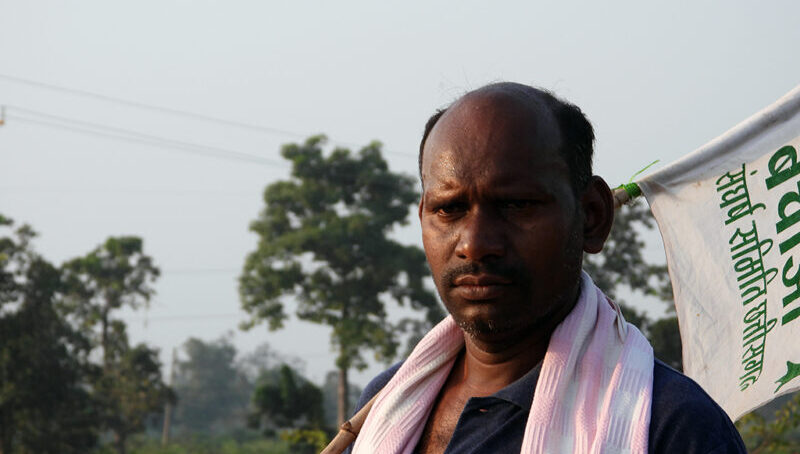
Umeshwar Singh Armo is one of thousands of indigenous people who have been fighting against coal mining in the Hasdeo Aranya reserve for the past decade. (Photo: Devendra Shukla)
Twenty-two coal blocks with an estimated coal reserve of 5.2 billion tonnes were declared out of bounds for mining activities by the Indian government back in 2010. However, this did not prevent Adani’s Parsa East Kete Basan (with a capacity of 15 million tonnes per annum) coal block from getting mining approval from the environment ministry in 2011. Due to environmental concerns, the National Green Tribunal cancelled the mining permission. Subsequent litigation ended up with the Supreme Court of India approving coal mining but directing a comprehensive study to review the impact on the region.
Since then, the government has approved two more mines – Parsa (spanning 12.52 sq km and with capacity of 5 million tonnes per annum) and Kente (covering 17.59 sq km and with capacity of 9 million tonnes per annum). The coal would be mined for the state of Rajasthan, which has entered a mine developer operator agreement for its entire mining life with Adani Enterprises Limited.
“People living in the villages of Hasdeo Aranya have been opposing these coal mines since the beginning,” says Balsai Korram, a resident of Hariharpur village, located in Hasdeo. “Meanwhile, Rajasthan State handed over all its mines to Adani. When the process of acquisition of land for the new Parsa coal mine started last year, the opposition of tribals intensified.”
In March, tribal women launched a tree-hugging protest, recreating the chipko protests which started in 1970s to protect forests from felling. The Hindi word chipko means “embrace”, as villagers hug the trees and encircle them to prevent them from being hacked. Renowned Indian environmentalists and social activists, such as Medha Patkar and Ulka Mahajan, have joined the demonstrations.
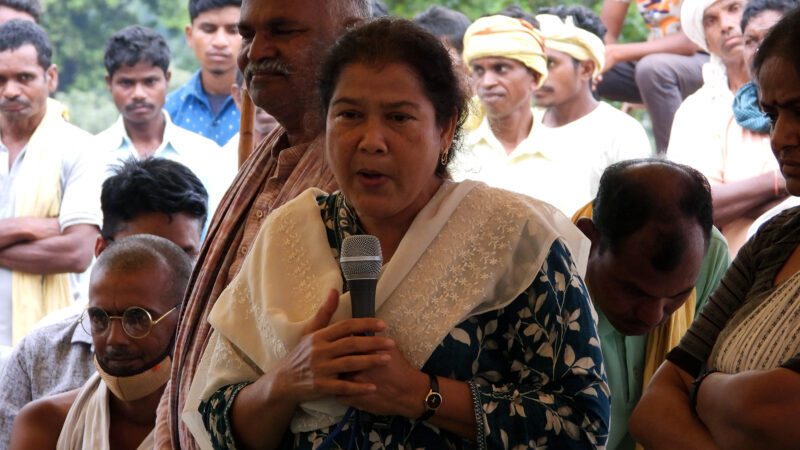
Ulka Mahajan, a prominent social activist in India, joined the Hasdeo demonstrations (Photo: Devendra Shukla)
Sunita Porte, one of the protesters from Ghatbarra village, says that representatives of the Adani Company, along with hundreds of policemen, arrived during the night of 30 May to clear the trees for the new Parsa East Kete Basan coal mine.
The villagers decided to remain in the forest and guard the trees. Even during the heatwave and incessant rainfall, they held their ground, singing songs that invoke the spirit of struggle and resistance.
It is currently the rainy season in Chhattisgarh, the “rice bowl” state of India, when rice is sown in the fields. Indigenous communities are not out in the fields but in the forest, clinging to the trees day in, day out. The village youth keep guard, watching the roads leading to the forest.
The villagers have erected temporary campsites with dry wood, where they hold sit-in protests and demonstrations, and deliver speeches. They continue to earn an income by collecting forest produce, processing it at the site and taking it to the market from there. Women walk around the area carrying lathis (heavy wooden sticks) and keeping a look out for tree markings, wood-cuttings and other suspicious signs.
“The Chhattisgarh State Congress party has just held a public hearing for a new coal mine and a postponement order has been issued for a few days,” says Porte. “But neither the work of the existing coal mine has stopped nor the approval of the Parsa and Kente extension to the Adani coal mine has been cancelled. Given the circumstances, we have no option but to fight peacefully.”
#mc_embed_signup{background:#fff; clear:left; font:14px Helvetica,Arial,sans-serif; }
/* Add your own Mailchimp form style overrides in your site stylesheet or in this style block.
We recommend moving this block and the preceding CSS link to the HEAD of your HTML file. */
Known as the “lungs of Central India”, the Hasdeo Aranya forests are spread over an area of around 1,878 square km. They hold the catchment of the Hasdeo Bango dam, which irrigates almost half a million hectares of croplands throughout the year.
The mines are fueling deforestation of Hasdeo. To date, 125,547 trees have been cut to clear space for the Parsa East Kete Basan coal mine. Another 242,670 trees are set to be cut.
Villagers say this deforestation is already devastating their livelihoods.
“The people who were displaced by the coal mines had to move to the nearby town. The amount they had received in compensation was exhausted within a few months. Now they have no option but to work as labourers in the town,” said Ramlal Kariyam, who lives in Salhi village.
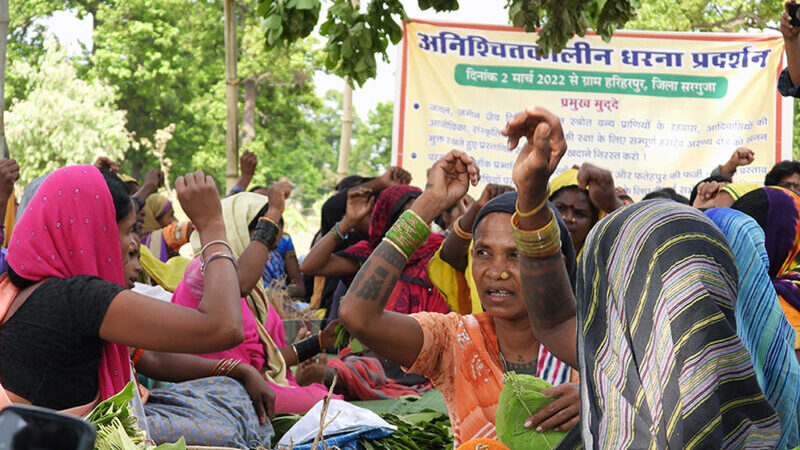
Indigenous women have played an important role in the demonstrations, launching a Chipko-style protest to protect the trees from felling (Photo: Devendra Shukla)
Villagers say the ground water levels have dropped significantly in settlements close to the existing mines, resulting in the drying and dying of vegetation and a lack of drinking water.
Priyanshu Gupta, assistant professor at the Indian Institute of Management, told Climate Home News: “The long term consequences of cutting Hasdeo Aranya forests will be disastrous not just for the region but also for entire central India, and will be a setback against the global fight to prevent climate change.
“Disrupting the last remaining dense forest patch in central India which will bring unforeseen land-system changes, chemical imbalances in atmosphere, and also threatens the survival of several critically endangered species like elephants, tigers and sloth bears,” he said.
Meetu Gupta, a member of the Chhattisgarh state wildlife board and a wildlife expert questioned how the government could ignore the study carried out by the Indian Council of Forestry Research & Education and Wildlife Institute of India in Hasdeo Aranya on the orders of the Supreme Court.
“The report has recorded significant presence of endangered flora and fauna in the area, some of which have been accorded the highest protection under Indian wildlife laws,” Gupta says. Endangered plants include the Aster and Boswellia serrate, that produces Indian frankincense.
The Indian Council report warns that any disturbance to the intact elephant habitats of the region may aggravate the already growing problem of human-elephant conflict in the state.
Forged consent
The local communities have explored all possible constitutional means and methods to articulate their resistance to mining. They have passed resolutions in the gram sabha (village council), registered widespread opposition at public hearings, written thousands of letters, petitions, and representations, and knocked on all doors in the central and state governments, conducted periodic protests from Hasdeo to New Delhi.
As they live in a scheduled area, with a predominantly tribal population governed by a special constitutional mechanism, the indigenous communities of Hasdeo Aranya are guaranteed a right to “free, prior and informed consent”, by the Panchayat Extension of the Scheduled Areas Act, 1996 and Forest Right Act.
However, fresh mining clearance was issued for the Parsa block in April, on the basis of what the local villagers allege is a fake gram sabha resolution. Villagers claim that documents the Rajasthan government and the Adani group used to show as approval for the coal mine, dating back to 2019, are forged since no gram sabha signing meeting took place.
“There are many people in my village, who died years ago, but have been claimed to have attended government meetings, and their signatures are also in the papers. We have registered our complaints with the state government but this has not been investigated till now,” Jaynandan Porte, head of Ghatbarra village council, told Climate Home News.
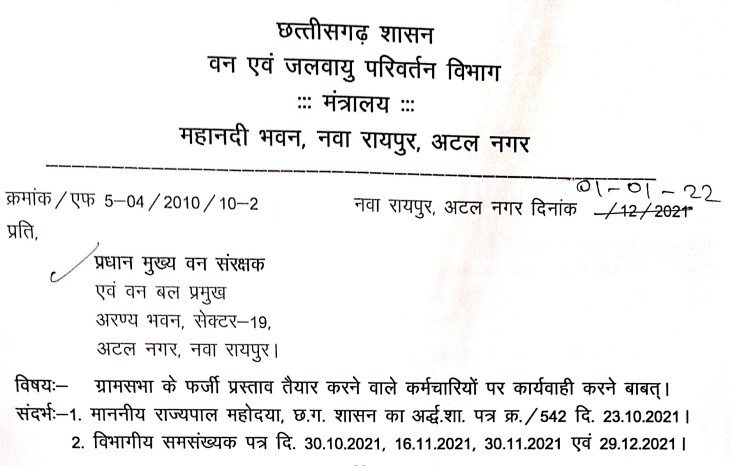
A complaint letter from villagers alleging that consent documents to clear forest area for mining were forged by the Rajasthan government and Adani.
The villagers have called for an enquiry into this fake gram sabha matter for over three years, and arranged a meeting to discuss this with the chief minister Bhupesh Baghel and governor of Chhattisgarh Anusuia Uike in October, following a 300km march. The latest clearances for the Parsa coal mines were granted in April 2022 despite this pending enquiry.
Alok Shukla, convener of the Chhattisgarh Bachao Andolan, a consortium of civil organisations, calls the auction of coal mines “an attack on the constitutional rights of tribals and profits for industrial houses”.
He says that for many coal mines in Chhattisgarh, fake papers were used. “In addition to the issue of fake and forged gram sabha, the mining projects in Hasdeo Aranya have had a long history of irregularities, many of which are currently at various levels in the courts. There are financial irregularities in them as well,” says Shukla.
“The Congress party government are definitely saying that they have halted the process of new coal mines in Hasdeo, but the ground reality is completely different,” Shukla told Climate Home News.
On 26 July, the Chhattisgarh legislative assembly unanimously passed a private member resolution urging the Centre to cancel allocation of all coal mining blocks in the Hasdeo Aranya. Yet preparations to start the mine continue.
Adani did not respond to Climate Home’s request for comment regarding the continuation of mining in Hasdeo.
“There have been claims that constitutional process has been violated in relation to gram sabhas. In all such matters the government conducts and is committed to conduct impartial investigations,” Chhattisgarh minister TS Singhdeo told Climate Home News.
“On the one hand the prime minister of India says in international forums [such as Cop26] that India will reduce the use of coal to 0% by 2070 and by 2030 reduce the use of coal by 50%,” said Medha Patkar, head of Narmada Bachao Andolan, a social movement made up of indigenous people, farmers, environmentalists, and human rights activists. “But after returning from those forums, some more coal mines were approved.”
“Now efforts are being made to eliminate rich forests like Hasdeo Aranya [which are in] the catchment area of Mini Mata Dam. If the forests are destroyed then the water catchment area will be affected and 4,33,500 lakh hectares (4,335 sq km) of land irrigation will stop, crops will not grow, and thousands of farmers will be ruined,” said Patkar.
Chhattisgarh chief minister Bhupesh Baghel, who fought to save the forests while in opposition, is now in favour of coal mining in Hasdeo Aranya. On various occasions in the past, the Congress party, including senior state and national leadership, lent their solidarity and support to the movement.
Baghel told a press conference that if the Hasdeo forests are cut, new trees will also be planted and that if the indigenous people are displaced, they will be given compensation.
“Those who are fighting the battle to save Hasdeo’s forest, who do not want coal, should first turn off the AC, cooler and electricity of their house,” he said, referring to campaigners who have air conditioning in their homes in Raipur. “Only then will their fight look real. In their houses, they are keeping their wives and children in AC and want others to stay in the dark. How is it possible?”
Activist and lawyer Sudiep Shrivastava, who has filed a petition in India’s Supreme Court against coal mines in Hasdeo, said all claims regarding the scarcity of coal and power crisis are ridiculous. Central government documents show that demand for power in India is around 170 GW, whereas the total electricity production capacity of the country is 388 GW.
“We will need 500 million tonnes of coal per year. Whereas Coal India, a government of India undertaking, solely produces 600 million tonnes of coal,” said Shrivastava.
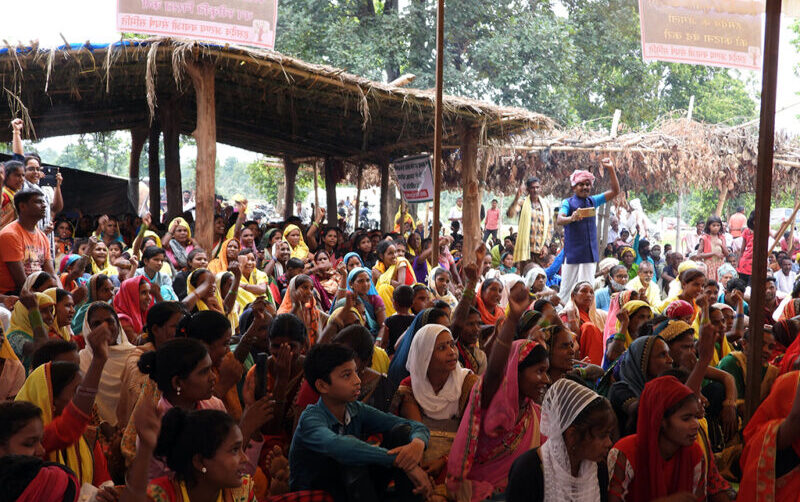
The villagers have erected temporary campsites in the Hasdeo forests, where they hold demonstrations. Photo: Devendra Shukla
Rajesh Kumar Sharma, chair of Rajasthan Rajya Vidyut Utpadan Nigam Limited, the electricity generation company of Rajasthan said that the Parsa East Kete Basan project has set new benchmarks in the mining sector and helped meet the state’s fuel requirements.
“Till now we have not received any instruction from the Government of India or Chhattisgarh state to halt the process related to the mines. If we do not get coal, then in the coming days there will be a power crisis in the state of Rajasthan ” Sharma told Climate Home News.
“Locals and the government of Chhattisgarh have extended their enthusiastic support for the project commissioning and we are confident to make similar progress for our other two blocks also. We are confident to commence the production at other two blocks in the near future to ensure an adequate electricity supply to meet the growing demands of Rajasthan,” Sharma added.
India’s minister of coal and mines Shri Pralhad Joshi denied that coal shortages are affecting the country’s power supply in parliament on Wednesday. “There is no shortage of coal in the country,” he said.
It is difficult to predict whether the treasured forests will survive or will be sacrificed on the altar of coal-based development. But it is very clear that the indigenous communities are not ready to give up on their homes and hopes.
Muneshwar Singh Porte told Climate Home News that he has been protesting for 10 years, since he was 17. “Now I am 27 and the fight is still on. I am ready to [dedicate] my whole life to the cause to save this sacred land.”
Main image: Communities around Hasdeo Aranya have been holding large-scale protests to demand the cancellation of new coal mines. Credit: Devendra Shukla. This article is part of a climate justice reporting programme supported by the Climate Justice Resilience Fund.